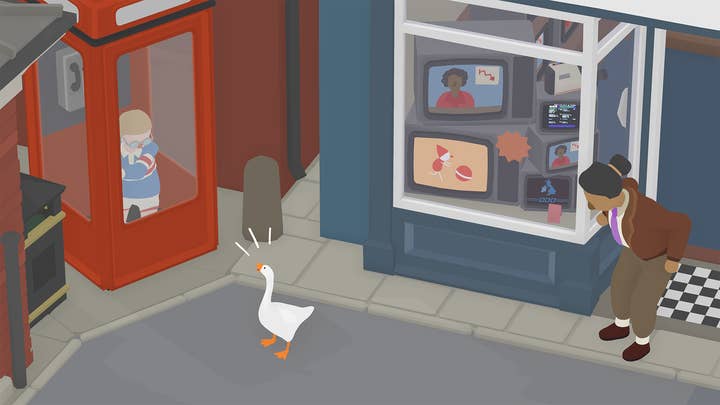Games of the Year 2019: Untitled Goose Game
Is the goose horrible, or is it me?
Up until the moment I started writing, I was undecided on my game of the year. On the one side we have Sekiro: Shadows Die Twice, and on the other we have Untitled Goose Game.
Sekiro is another masterful game from Hidetaka Miyazaki, drenched in horror and strange beauty, with all the lingering ruminations about death that I've come to love and expect in a FromSoftware game. It is 100% my bag.
But Untitled Goose Game, which is essentially a joke about a goose which got out of hand, is perhaps the most philosophically interesting game of 2019.
As I considered my options, I realised that once again I've not played that many new titles this year. The AAA scene continues to be -- mostly if not entirely -- a smorgasbord of games I cannot bring myself to care about. So many of the games released this year are sequels or games-as-a-service. Even those that try to be bold and ambitious, like Death Stranding, come with all the baggage of a modern AAA game: namely bloat.
"There is an inescapable innocence to the actions of a goose. It has no sense of consequences, acts without malice, and operates with pure id"
So when Sekiro -- which is largely unshackled from the weighty mess of the modern AAA business -- swung into the room on its grappling hook, with a sword between its teeth and a flamethrower where its left hand should be, it was my immediate GOTY. It's strikingly beautiful, both quietly haunting and bombastic. A triumph, without question.
But FromSoftware delivering an unparalleled experience in the realm of third-person action games is about as surprising as a tax-evading billionaire. It is exceptional, and almost certainly the "best" game released this year. Despite it all though, Sekiro lacks the magic of games like Dark Souls and Bloodborne -- perhaps because it has the misfortune of succeeding them.
Untitled Goose Game, however, has that magic. Much like Dark Souls, it's ripe for dissection and interpretation. My favourite deconstruction comes from YouTuber Grace Lee, who reads it as being critical of unjust power structures, viewing the goose as a radical agent of change in a world where the presiding school of thought is to maintain the cycle, uphold the status quo.

There is something about Untitled Goose Game that unleashes the mischievous part of our brain as we wreak havoc across a sleepy English village. Geese are well-known as horrible, dim-witted, but ultimately harmless animals. They walk around, bobbing their heads in rhythm to their steps, honking, flapping, and generally just doing goose stuff. There is an inescapable innocence to the actions of a goose. It has no sense of consequences, acts without malice, and operates with pure id.
The great genius of the goose, however, is that it is a blank slate. The absence of bloat with Untitled Goose Game encourages self-reflection; you ask your own questions, and provide your own answers. Is it about anything? What was the authorial intent? And does that even matter if we can draw our own conclusions? Is the goose horrible, or is it me?
And this is where the real magic of Untitled Goose Game arises: it's a question of morality.
"A goose might chase a boy into a phone box, but a person will chase a boy into a phone box for fun"
I cannot express how much I enjoyed tormenting villagers in Untitled Goose Game. In an area near the game's start, I repeatedly chased a small boy into a phone box. Every time I saw him, he was honked without mercy into the confines of his metallic red prison. After a time, when I grew tired of this game of child-and-goose, I would hang around threatening him with the odd honk or flap, just to watch him squirm. It was delicious.
Untitled Goose Game reminds me of The Mysterious Stranger, by Mark Twain. In the book, an angel named Satan visits a 16th Century German village, and causes mayhem among its populace by toying with them. He is always transparent, and honest with his intention. It's not so much his actions that cause harm, but the human response.
The angel reveals he has no moral sense, and cannot commit sin because he does not know what "wrong" is. One of the book's themes is how the moral sense makes humans uniquely evil; they understand the difference between right and wrong, yet continue to knowingly inflict suffering on others.
Herein lies my favourite aspects of Untitled Goose Game: despite the goose's many heinous acts, the goose is innocent. It has no moral sense. Humans, and only humans, can commit evil. A goose might chase a boy into a phone box, but a person will chase a boy into a phone box for fun.
In an interview with Vulture, Jacob Strasser from developer House House said: "The goose is just a goose. The goose is this chaotic neutral character. They're just an animal who's not really aware of what they're doing."
So while I greatly enjoy the academic deconstructions of Untitled Goose Game and what it says about power and oppression, for me what elevates it is the idea of how the goose is innocent, but you -- the player -- are evil.
